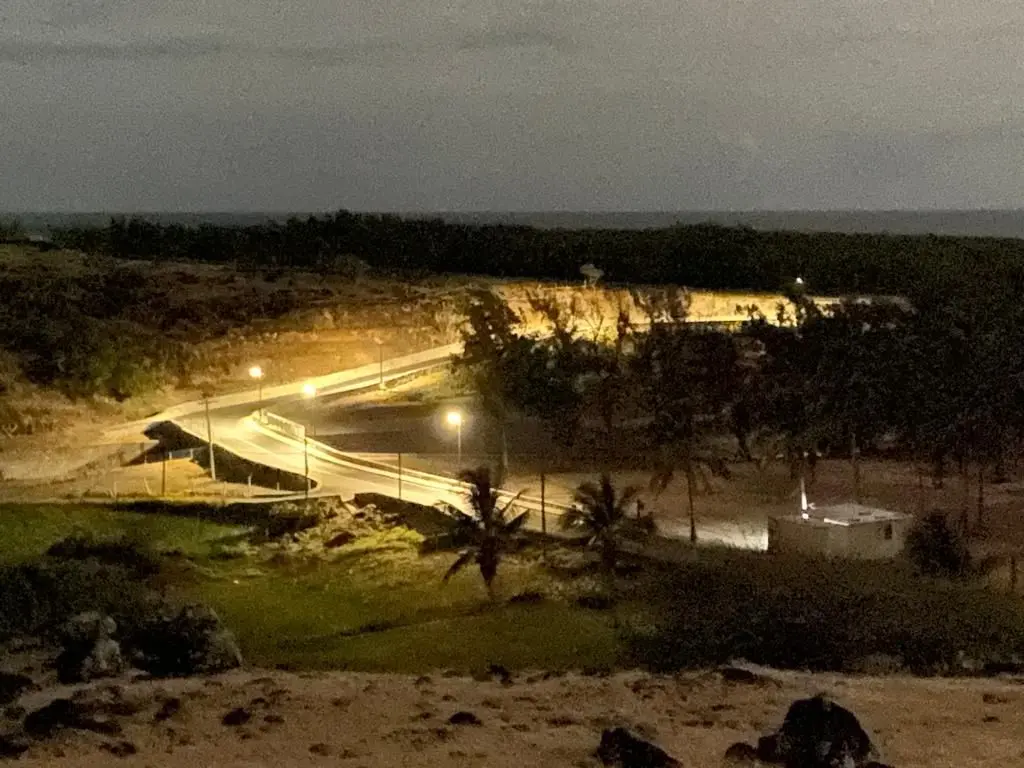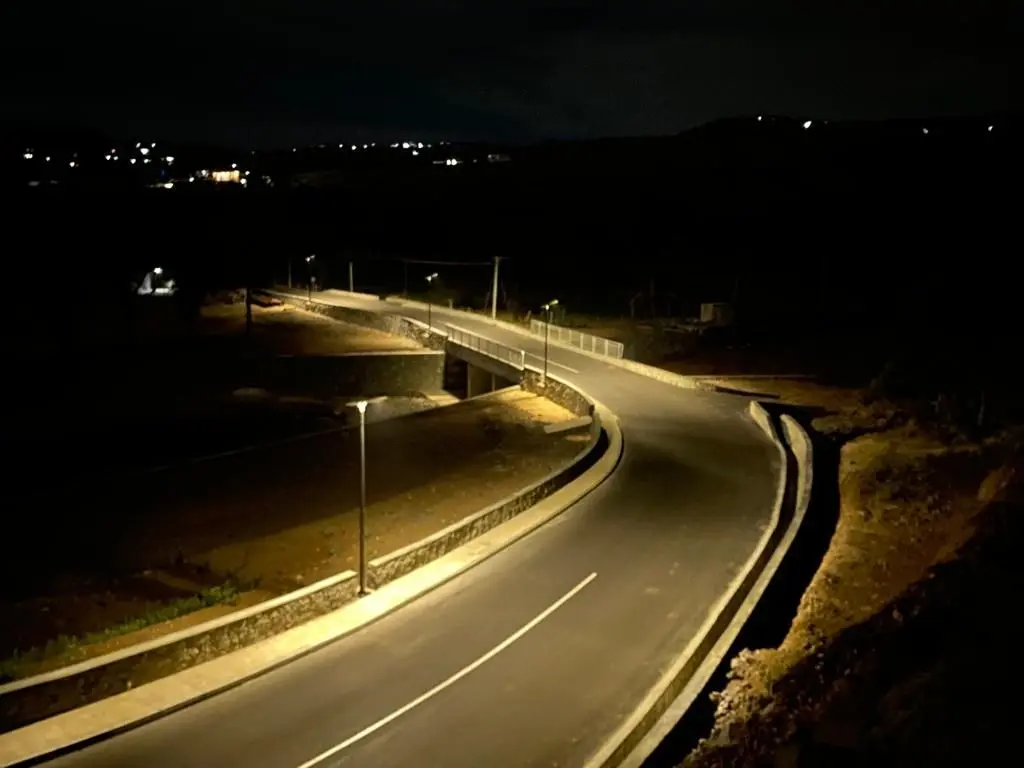Abstract
This paper presents a successful case study of upgrading the lighting along a key coastal road in Mauritius using the Sresky Atlas Series of integrated solar street lights. In the face of high salt spray, high humidity, tropical storms, and other harsh oceanic climate challenges, the project not only modernized road lighting but also significantly improved traffic safety, boosted the tourism economy, and injected new momentum into Mauritius’s sustainable development strategy.
I. Project Background and Needs Analysis
1.1 Project Location and Environmental Challenges
The project is situated on a major coastal highway connecting towns and cities along the route. This road serves not only as a vital transportation lifeline but also as a showcase for the tourism industry in Mauritius. However, the coastal environment presents the following key challenges:
-
Highly corrosive environment: Salt-rich air and high humidity are extremely corrosive to metals and electronic components, posing a major threat to the service life of outdoor equipment.
-
Extreme weather threats: Frequent tropical storms and seasonal heavy rainfall place high demands on the structural strength, water resistance, and rainy-day performance of street lights.
-
Ecological and aesthetic sensitivity: Coastal ecosystems are fragile, requiring lighting designs that minimize light pollution’s impact on marine life. At the same time, as part of the tourist landscape, the appearance of street lights must harmonize with the coastline’s natural beauty.
1.2 Core Requirements Analysis
Based on the strategic positioning and environmental characteristics of the Coastal Highway, the Mauritius Department of Transport and Municipal Services (MTMS) identified the following key requirements:
-
Ensure nighttime traffic safety: The winding coastal highway has low visibility at night, requiring continuous, bright lighting to reduce driving risks and ensure the safety of both drivers and pedestrians.
-
Enhance the tourist experience: Create a safe and beautiful “luminous coastline” to extend tourists’ nighttime activities and strengthen Mauritius’s appeal as a global tourist destination.
-
Green and low-carbon operations: Adopt a 100% clean energy lighting solution to reduce the nation’s carbon footprint and reinforce its image as a “green tourist destination.”
-
Long-term cost control: Avoid the high costs of submarine or coastal cable laying by using a zero-electricity, low-maintenance solution that provides long-term savings.
II. Technical Solution Design – Sresky Atlas Series
After multiple rounds of technical evaluation, the Sresky Atlas Series integrated solar street light was chosen as the ideal solution thanks to its tailored design and exceptional performance in coastal environments.
Ultimate Anti-Corrosion Design
-
Material selection: The lamp body is made from high-strength aluminum alloy and PC material. The aluminum alloy surface naturally forms a dense oxide film that resists salt spray erosion. The key connecting bracket undergoes a double anti-rust treatment to eliminate corrosion and fracture problems common in coastal areas.
-
Response strategy: Through advanced materials and innovative processes, the Atlas Series ensures a long service life in high-salt, high-humidity conditions, greatly reducing replacement frequency and maintenance costs.
All-Weather Stable Operation Guarantee
-
Protection: An IP65 waterproof and dustproof rating ensures internal components are fully protected from moisture and rain intrusion. An IK08 impact resistance rating enables the lights to withstand high winds and debris impacts during tropical storms.
-
ALS2.4 Intelligent Light Failure Compensation System: By forecasting weather conditions and dynamically adjusting power output, Atlas street lights maintain 100% lighting availability for more than 10 consecutive rainy or cloudy days—resolving the power outage issues of traditional solar street lights during the rainy season.
-
TCS Intelligent Temperature Control System: Designed for Mauritius’s high temperatures, TCS technology monitors battery temperature in real time to optimize charging and discharging efficiency. This extends lithium battery life to 2,000 cycles, outperforming traditional lithium iron phosphate batteries.
Professional Optical and Energy-Saving Solutions
-
Type II light distribution design: Optimized for highways, the beam precisely covers the road surface while minimizing stray light toward the ocean, reducing ecological impacts on marine species such as sea turtles and seabirds.
-
PIR intelligent motion sensor: Equipped with a 120° detection angle and 8-meter range, the high-sensitivity PIR sensor supports multiple lighting modes.
-
Energy system modularity: Each component is designed for direct replacement on the light pole, simplifying maintenance and lowering life cycle costs.
III. Project Outcomes and Impacts
4.1 Social Value
-
Nighttime safety barrier: Bright, uniform lighting now covers every section of the highway, greatly reducing nighttime accident risks and ensuring safety for drivers and pedestrians.
-
Landmark landscape: At night, Atlas street lights line the coastline like strings of pearls, with their reflection on the sea creating a unique scenic attraction for visitors.
-
Community connectivity: Reliable lighting enables safer nighttime travel for residents, fosters communication between communities, and strengthens social cohesion.
4.2 Economic and Environmental Value
-
Significant cost savings: Powered entirely by solar energy, the project eliminates the need for costly submarine or coastal cable installation and long-term electricity bills. The modular design and three-year warranty further reduce maintenance costs.
-
Boosting tourism: The safe, visually appealing nighttime coastal route extends tourist activity hours and stimulates the local evening economy, including dining and accommodation sectors.
-
Environmental protection in action: The project reduces substantial annual carbon emissions, while precise light distribution safeguards marine ecosystems—aligning perfectly with Mauritius’s “green tourism” strategy.
V. Conclusion
The Mauritius Coastal Highway Solar Street Light Project demonstrates the harmonious integration of technology and nature. The Sresky Atlas Series, with its corrosion-resistant design, ALS2.4 long-endurance system, TCS temperature control technology, and eco-friendly light distribution, successfully meets the severe challenges of the coastal environment. It delivers safety, beauty, and sustainability while setting a benchmark for green development in Mauritius through a zero-carbon, zero-electricity-cost model.
As a global leader in solar lighting, Sresky has showcased the perfect blend of technological innovation and environmental responsibility through this landmark project.
Table of Contents

